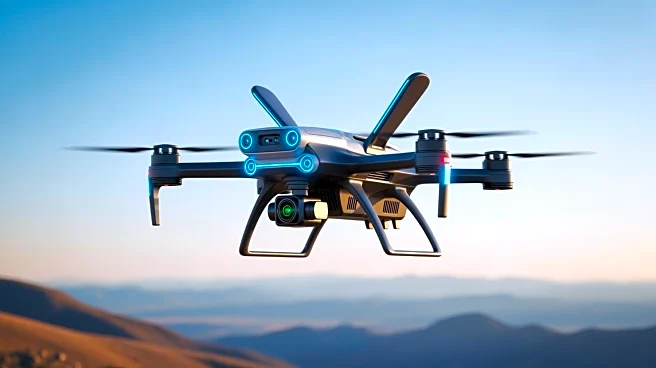What's Happening?
DJI, a prominent dronemaker, is preparing to launch a new version of its Neo drone, known as the Neo 2. This updated model features enhancements such as gesture and voice control, omnidirectional sensors,
a 2-axis gimbal, and improved battery life, offering 19 minutes of flight time. Despite these advancements, the Neo 2 may not be available in the U.S. due to government concerns over Chinese surveillance. The U.S. government has labeled DJI as a 'Chinese Military Company,' leading to a soft ban on its products, including drones, over national security risks. DJI has filed an appeal against this designation, but U.S. consumers currently face limited options for purchasing DJI products.
Why It's Important?
The restrictions on DJI's products in the U.S. highlight ongoing tensions between the U.S. and China, particularly concerning technology and national security. DJI's drones are popular for their affordability and advanced features, making them a preferred choice for many consumers. However, the U.S. government's stance reflects broader concerns about data security and the potential for foreign surveillance. This situation impacts U.S. drone enthusiasts and businesses relying on DJI's technology, potentially driving them to seek alternatives. The outcome of DJI's appeal could influence future trade relations and technology exchanges between the two countries.
What's Next?
DJI's appeal with the U.S. Court of Appeals is a critical step in addressing its designation as a 'Chinese Military Company.' If successful, it could pave the way for DJI to re-enter the U.S. market, offering consumers access to its latest drone technology. Meanwhile, DJI continues to optimize its strategy to serve U.S. customers amidst evolving conditions. The company must navigate tariffs and international shipping challenges, which could affect the availability and pricing of its products. Stakeholders, including drone enthusiasts and industry players, are closely monitoring these developments.
Beyond the Headlines
The situation with DJI underscores the complex interplay between technology, national security, and international trade. It raises ethical questions about surveillance and data privacy, as well as the role of government in regulating foreign technology. Long-term, this could lead to increased scrutiny of tech companies and their products, influencing global trade policies and consumer choices. The case also highlights the importance of innovation and competition in the tech industry, as companies strive to balance security concerns with technological advancement.









